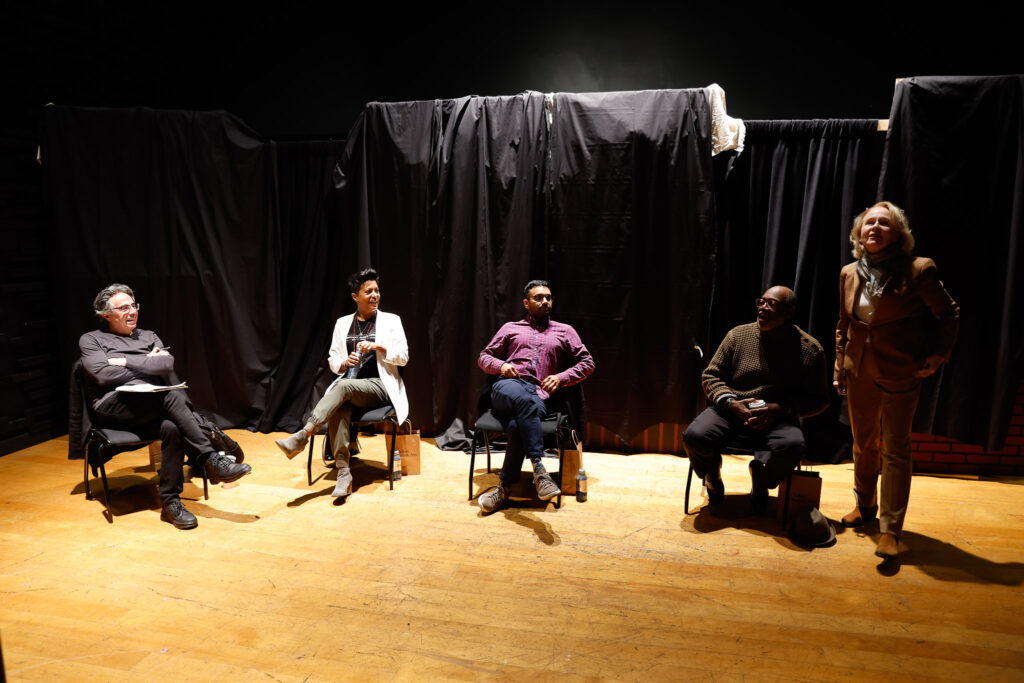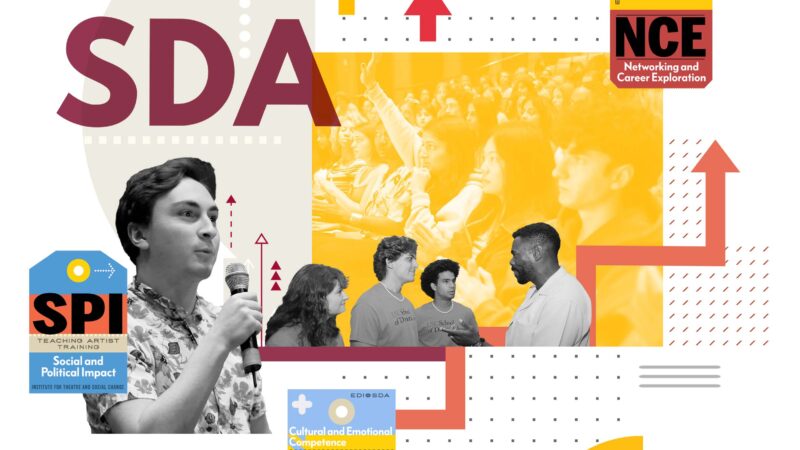There are big changes afoot at the School of Dramatic Arts Career Center this year; two new employees have come on board, the Center has expanded its focus and it has a new name. The office, on the second floor of the Jefferson Building, now is called the Professional Development Center. Its expanded mission is to expose students to the full spectrum of career possibilities for which their dramatic arts degree has prepared them.
SDA Dean Emily Roxworthy explains: “The name change signals that SDA is going beyond preparing students for a singular career. We are intent on diverse professional development because sustaining a career in today’s entertainment industry entails being a multihyphenated artist rather than pursuing a single, linear career.”
To that end, veteran casting director and Center Director Dan Shaner and his assistant Jennifer Arias have been joined by two new hires working remotely in other parts of the country. Noted casting directors Daryl Eisenberg and Ally Beans have joined the staff as the new Theatre Industry Liaisons. Responsible for targeted territories (West Coast/Chicago and East Coast), they work with students who are looking for opportunities to align their academic interests with individual career and professional pathways through exploration and engagement in extracurricular opportunities in the professional theatre. During the hiring process, the School emphasized attracting industry insiders in order to keep current with employment trends.
“We cover film and TV pretty well, and we are excited to expand to employment opportunities with theatre companies, apprenticeships, internships and partnerships across the country in the regional theatre space,” says Shaner. The new liaisons will expand SDA’s footprint in musical theatre, assisting with the spring showcase in New York City. Eisenberg and Beans will travel to campus a few times each year for events, in-person meetings with students and team-building with SDA faculty members.
First of its Kind
The Professional Development Center, which was the first dedicated career center at a drama school when it launched in 2017, continues to
offer its wide range of supportive services to students and recent alums, such as a free self-taping facility, free headshots and industry mentors (more on those later.)
But it has also been involved with two new initiatives developed by the dean’s office for this academic year: a series of multihyphenate intensives and a passport that “gamifies” SDA students’ participation in professional development activities outside the training for their particular craft. By stamping different areas of their professional development passport, students earn prizes such as SDA swag.
This year, the School is holding 10 multihyphenate masterclasses—five in the fall and five in the spring. In addition to current students, many of the events are open to SDA alumni.
Guest artists, including well-known actors, directors, artistic directors, writers, designers, studio heads and others, have visited campus. They examine subjects such as artistic entrepreneurship, straddling stage and screen, and what it means to be an artistic director in today’s entertainment industry.
In the past, says Dean Roxworthy, career training at drama schools was primarily focused on acting. “We want to support all of our students, not just those who want to be professional actors,” she notes. “We want to open the Center and career development up to support students moving into other industries.”

She sees the expansion of the Center’s focus in personal terms. When Dean Roxworthy approached her own college graduation, she realized that being a professional actor was not her dream anymore—but didn’t know what else to do with her performance studies degree. Her alma mater’s central career center simply told her to go into marketing, leading to an unhappy job in advertising. “I wish I had understood when I was finishing my degree what else I could do with it that would be fulfilling,” she said.
She also sees the mission of the Center as an ethical imperative. “If you’re going to commit four years of your life or three years of an MFA to get a world-class education, you should be as prepared as you can be to sustain a career as a working artist.”
So in addition to the intensive masterclasses, where students hear from multihyphenates, SDA’s new passport program acquaints students with resources on campus that can broaden their career outlook. For example, the USC Gould School of Law offers a legal studies minor that could be useful to an SDA student thinking about entertainment law or management. Attending an information session about that minor would earn them a passport stamp.
The idea is that the passport maps topics the students can add to their career toolkit, a visual representation of various services and opportunities and how they fit into the students’ SDA curriculum.
Dean Roxworthy says it can be hard to get SDA students to explore career development because they are so focused on working on productions, even though they know they could gain useful information for the future. She observes: “They just want to make art. Which is great, but we also want them to be professionally prepared.”
Such preparation is what Dan Shaner and the Professional Development Center are all about. The Center is most involved with students in their final semester at SDA when, Shaner says, many feel a pervading sense of dread about what they are going to do after graduation. First, he helps students get their resumes, reels and headshots in order before they present them to a prospective agent or manager. “We spend time making sure those things are as polished as possible.”
The School offers a free headshot service, giving students edited images of two different looks taken by a professional photographer. An online acting coaching service is available to help with self-tapes and auditions. Students and recent alums can book the self-tape studio located in the Professional Development Center which boasts a blue screen, a good lighting setup, an excellent camera and technician, and a reader if necessary.
Shaner also helps students map out realistic next steps on an individual basis.
“Some students are design and production students, and some are just interested in finding jobs that will sustain them,” he notes, so twice a month he sends out an email blast listing opportunities for those populations.
One of the most significant benefits the Professional Development Center offers is to arrange industry mentorships for those close to graduation.
Cameron Murphy, a 2022 MFA Acting graduate, says he was amazed and appreciative that Shaner found him a mentor who is doing exactly what he wants to do in the industry—act, write and direct. “The fact that he’s doing what I want to do helps me see the path is there,” says Murphy. His mentor is David Fickas BFA ’96, a founding member of the SDA Alumni Leadership Council.
He first met with Fickas at the end of his final year. Fickas came to his showcase and now checks in with him every few weeks. Fickas first suggested that Murphy film his scene from the showcase, and then suggested that Murphy write an original scene to film. That suggestion turned into the two of them writing a short film together.
“Meeting David was a huge influence on me wanting to stay in Los Angeles,” says Murphy. Since graduating, he has been writing and auditioning, and has directed a play in North Hollywood. He expanded a 10-minute play he wrote for an SDA class during his second year into an entire one-man show tentatively titled Bad Actor.
Murphy has used the SDA free headshot service, and plans to make use of the self-tape facility.
“I’m very grateful to have benefitted from the Center when I was transitioning to the real world,” says Murphy.
His MFA Acting 2022 classmate Stephen Humes continues to benefit from the Professional Development Center with a mentor and ongoing use of the self-tape studio. Shaner connected Humes with mentor Rachel Saltzman ’11, a talent manager at Schachter Entertainment. “She was a great resource for me all through the showcase as I was able to bounce ideas off of her,” says Humes. He says the fact that she wasn’t looking at him as a prospective client was freeing, and allowed them to focus on the material he was considering for the showcase. “All through the showcase prep, we would meet for coffee,” he recalls. “She’s a friend to this day.”
In addition to evaluating dramatic material, Saltzman answered his questions on working with his representatives, the importance of social media and other issues.
Humes, who has both commercial and theatrical agents, as well as a manager (and is the co-host of a long-running podcast about craft beers), auditions several times a week, and uses the self-tape studio regularly. “You show up with your lines memorized and you’ll be out in 30 minutes. They email the tape to me before I even make it home. The camera is great, the sound is great, there’s a good three-point lighting setup. Having all that logistical stuff handled has been a godsend. I can’t say enough about it.”
Humes, who was an actor in New York for four years before getting his MFA, says he is also pleased that SDA has added regional industry liaisons. “In L.A., we’re kind of isolated from the regional theatre circuit,” he observes. “They do a lot of stage summer stock auditions, but they do them in New York. So reaching out to the regional theatres is 100 percent a good idea.”
The Center provides important benefits for SDA students who take advantage of them, Humes says. Even with representation, the industry increasingly requires you to act as your own agent and chart your own course. At the Professional Development Center, the resources are there to help you do just that.
This article appeared in the 2022-23 issue of Callboard magazine. Read more stories from the issue online.
